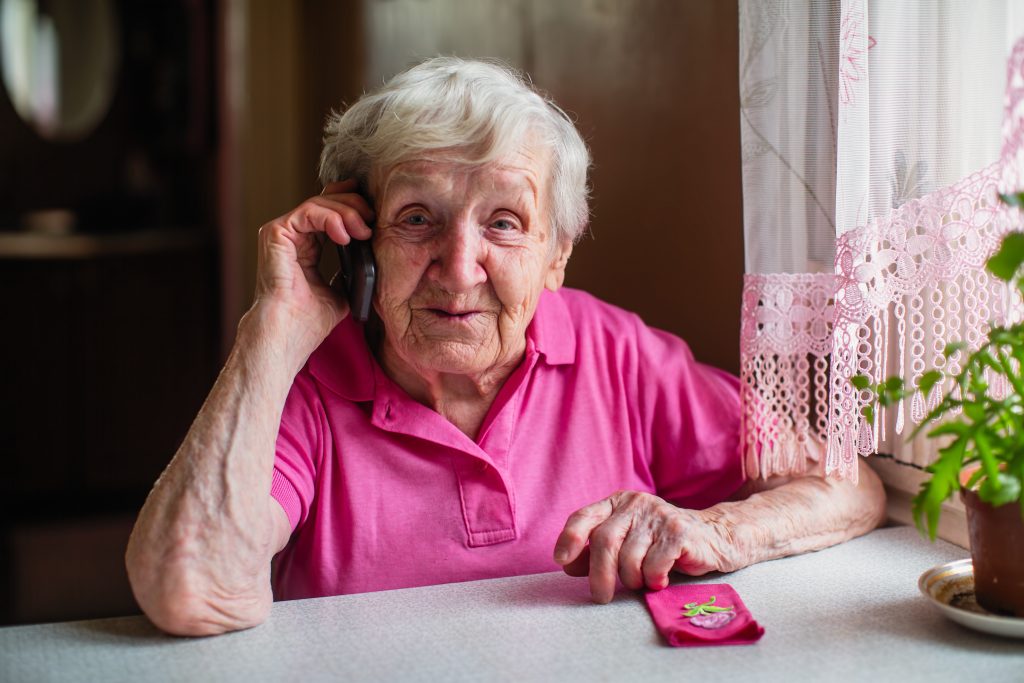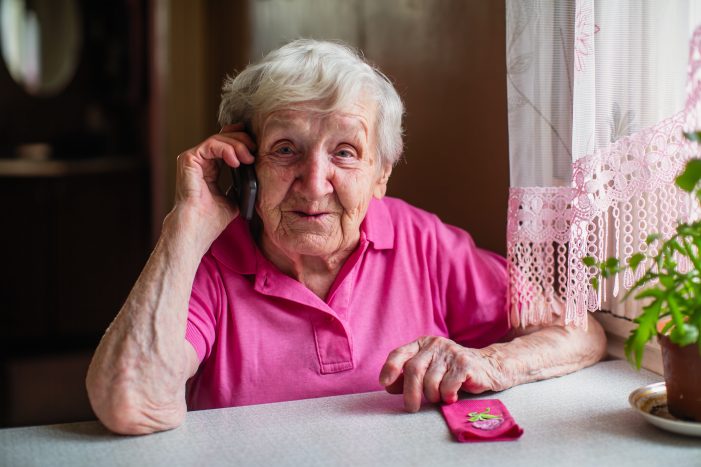
ROCKWALL, TX (Dec. 2, 2022) Caring for an ailing loved one from afar takes organization, planning, and teamwork. Here are both practical and emotional tips to help you be a successful long distance caregiver.
Successful Long Distance Caregiving
It starts with you and your perspective. Be Realistic! You will not be able to do everything, but you will be able to do enough. You will not be able to satisfy everyone’s expectations, but you will be able to satisfy crucial needs.
Recognize that you will need help. Ask for it! If you have a personal conviction that keeps you from asking for help, seriously consider giving yourself permission to change that rule. If you define successful caregiving as “doing it all” you are sentencing yourself to unnecessary guilt and misery that will drag you down and limit your ability to provide good care. Don’t do it!
Develop healthy boundaries with family members and set their expectations to respect your abilities and limitations.
Taking Care of Yourself!
Being a successful caregiver starts with caring for yourself. Practice giving freely, respectfully, and lovingly without giving yourself away. Here are six tips to help you:
- Learn – The more you know, the more you get from your efforts, the better you feel about yourself. Grow! Respect your own limitations and abilities, develop boundaries around them, enjoy successes within them.
- Rest – You are not a superhero, so get some rest
- Recreate – Physical exertion as well as mindless activities have their place and healing qualities.
- Laugh – Research has shown that even the anticipation of laughing positively stimulates body chemistry
- Love – Spend time with people who energize you mentally, emotionally, and spiritually. Limit relationships that drain you.
- Let Go – Let go of regrets, guilt, and perfectionism.
Make a commitment to yourself to take your own advice and take care of you! If you do, you will take better care of your loved ones.
Assessing From A Distance
Before you can help your loved one you have to carefully and accurately assess their situation.
The telephone may be the most important tool in long distance caregiving. During phone calls with your loved ones, listen for warning signs. Do they refer to any significant changes in their physical, social, or financial situation? If so, do these accounts agree with your own and others observations? Or does it seem that they are exaggerating or minimizing any concerns? If so, you may need an objective third party to conduct an assessment.
In-Person Assessments
Schedule a non-emergency visit for up-close assessment. Determine if your loved one’s need help, a change, or improvement. To the fullest extent possible, plan with rather than for your loved ones, considering their interests and preferences as well as their needs. Here are some tips for making the visit count:
- Do all you can to maintain a positive attitude!
- Use the resources listed below to prepare as much as possible before you leave.
- If possible, set aside enough time to include pleasure as well as business in your trip.
- Prepare for your loved one’s possible reactions.
- Your visit will involve a lot of personal questions and possible life-style changes.
- Anticipate how your loved one might respond.
- Arrange for siblings, friends, other family members, or anyone else who might be involved to be present and participate.
- Realize that you may not be able to identify all of your loved one’s needs and identify all resources in one visit.
- You will probably need to follow up after you return home.
Assets and Needs Inventory
Create and assets and needs inventory by answering these questions:
- What seems to be working well, and what are the needs?
- What is his/her general health status?
- Is he/she able to take care of daily grooming and hygiene?
- Is he/she able to move around with little or no assistance?
- Is he/she able to prepare meals?
- Is he/she eating nutritious meals?
- Is he/she going to doctor appointments as needed?
- Is he/she taking medications as prescribed?
- Is he/she able to pay bills?
- Is he/she able to do housekeeping?
- Does he/she have social contact outside home?
- Can he/she still drive? If not, does he/she take a taxi/ride-share, bus, or ask for help?
- Is his/her home safe and free of hazards?
- How well has he/she adjusted to deaths, especially those close friends or relatives?
- How well has he/she adjusted to changes in living arrangement?
- Has he/she prepared legal documents, such as wills and advance directives? Are these documents in a place where other family members can find them?
- Are insurance policies up to date? Where are the copies kept?
Risk Assessment
Evaluate your care recipient’s current (and potential) level of risk by answering these questions:
- Is there an emergency?
- Is health or safety at risk? If so, is there anyone else who can intervene on your behalf?
- Can a temporary plan be developed until you are available to go?
- Is there anyone in the area who can provide objective, reliable information about the situation?
Engaging Your Care Recipient When They are Resistant
Ask them to be honest about how they feel about receiving help. Talk about the consequences of what will happen if you do not get help now. Explore concerns about how much that the service will cost and what financial assistance is available. Explain what the service will do. Listen to their fear, don’t argue and accept it even if you do not agree. Be positive and offer support.
If your family member is resistant, consider these measures for a smoother transition to needed services.
- Investigate services and service providers until you have a level of trust in them. Your confidence and trust will transfer to your loved ones.
- Ensure that he/she understands the service and how it will contribute to their independence.
- Accompany him/her to a facility such as a senior center to provide support in the beginning, or be present for in-home services.
- Explain what it means to you and perhaps ask him/her to do you a favor and just try it, perhaps on a trial basis.
- Offer the service as a gift if there are financial concerns.
- Have a person he/she respects approach him/her about it.
Engaging Family Members
It truly does take a community when caring for loved ones. Look for and engage natural supports, especially within the family itself. Talk to family members by having a family conference by telephone, videoconference, or in person. Clearly define what the needs are and ask for specific help. Ask meaningful questions, such as:
- What needs most closely match the skills of you and individual family members?
- Who makes decisions in the family? Is that working?
- What adjustments need to be made to how caregiver responsibilities are shared?
Communicate, communicate, communicate!
Social Network – Local, ‘Natural’ Supports
Who will be there when you cannot be? Use social networks to provide supports in your absence! Look in your community for providers who offer services that meet your loved one’s needs.
Use social networks to provide supports in your absence! These networks include persons with whom your loved one has a friendship, family, or faith based relationship. Look for naturally occurring relationships in your loved one’s social network. These could be friends, family members, neighbors, ministers, or other members of your loved one’s religious or social affiliations. Identify these persons early, ask for help, and engage them in the planning process. Exchange contact information and communicate regularly. Use these allies as your eyes and ears to get objective view points on your loved one’s health and safety. Use them as your arms, hands, legs, and feet and voice for providing support in your absence.
When Family Members are Resistant
Perhaps a sibling or other family member whom you believe has a responsibility to help is not doing so. Ask him/her to help! But do it tactfully. Stay away from statements that typically begin with “you” and sound like you are accusing someone of doing something wrong such as “You are not being responsible!” or “You obviously don’t care about me or our parents!” Instead use “I” statements that are your own thoughts, opinions, and emotions and communicate them calmly, such as
- I cannot manage this alone.
- I feel overwhelmed.
- I am concerned that Mom’s care requires more than I can provide myself.
- I feel that the responsibility for Mom’s care has been left to me and I don’t think that’s fair to either one of us.
- I do not mean to complain or criticize, and I very much appreciate you listening to me.
- I would like to let you know what I have found out about what Dad needs and what we can do about it so far.
- I need you to call Dad at least once a month to help me out.
- When are you able to come see about Mom and do some things around the house?
Planning and Action
Begin developing action plans right away! Even if you have not thoroughly assessed the situation, it is not too early to start planning and taking action to meet needs. Action plans should take into consideration your loved one’s preferences, and allow them to exercise as much choice as possible. Action plans should be flexible, implemented on a trial basis, and changed as needed.
Local Service Providers
Local service providers include: physicians, doctor’s offices, hospitals, Home Health providers, transportation services, Assisted Living Facilities, Nursing Homes, Senior Day Care Centers, and others. Here are some tips for researching and working with them.
Organization Tips
Develop a filing or recording system to keep records before you call service providers. Your system can be as simple as using a spiral notebook, folders for individual or similar organizations, or a 3-ring binder with index tabs for each organization. Create a folder or section for similar organizations, e.g., Nursing Homes, Assisted Living, Hospice, In Home Health Care, Respite, etc.
If you will be recording information on your computer, create a new document (or entry) for each agency. Consider using a note taking application like Evernote which can be accessed on both your computer and your cell phone.
Calling Service Providers
When contacting service providers, make sure you are prepared. What do you want to know? Get the facts!
- What is the organization’s name, address, phone, fax, web address, etc.?
- Who are you talking to? Get their name, title, department, extension, and email address?
- What are their requirements? Eligibility? Fees? Documentation? Is there a waiting list?
- What is their application process?
- Do they offer special amenities, i.e., do they provide transportation?
- Do they have restrictions, i.e., are pets allowed in residential facilities?
Remember to have pen and paper by the phone if you are taking notes before you call a service provider.
Medical research
If they have a chronic illness or are dealing with sensory loss, learn as much about it as you can. Review the education modules and blogs on this site, including:
- Alzheimer’s disease and other Dementias
- Wellness and Chronic Illness
- Sensory Loss
- Medication Management
Also review our FAQ page including the section on Health & Wellness, and our Resource Directory for local and national resources.
Medicaid, Medicare, and Social Security
Research your care recipient’s potential benefits:
- Medicare – medicare.gov 800-MEDICARE (800-633-4227). TTY users can call 1-877-486-2048.
- Centers for Medicare and Medicaid Services (CMS) – cms.gov (410-786-3000)
- Social Security Administration – ssa.gov (800-772-1213)
- If applicable: Veterans Health Administration – va.gov/health (877-222-8387)
Resources for Caregivers
- Call 2-1-1 throughout Texas for information and access to health and human service information for all ages.
- Call 800-252-9240 to find local Texas Area Agency on Aging.
- Call 800-677-1116 – Elder Care Locator service to find help throughout the U.S.
Use resources such as Area Agency on Aging (AAA). Types of assistance provided by AAAs:
- Information and referral
- Caregiver education and training
- Caregiver respite
- Caregiver support coordination
- Case management
- Transportation assistance
Assistance available through AAAs for persons age 60 and older may include:
- Benefits counseling
- Ombudsman – advocacy for those who live in nursing homes and assisted living facilities
- Home-delivered meals
- Congregate meals
- Light housekeeping
Be sure to check out our Resource Directory, FAQ, and Educational Events Calendar for more great information! Permission is granted to duplicate any and all parts of this page to use in education programs supporting family members caring for elders.
Topic Quick Links – Click on a topic below to go to that area of the page.
- Successful Long Distance Caregiving
- Taking Care of Yourself
- Assessing From a Distance
- In-person Assessments
- Assets and Needs Inventory
- Risk Assessment
- Engaging Your Care Recipient When They are Resistant
- Engaging Family Members
- Social Network – Local, ‘Natural’ Supports
- When Family Members are Resistant
- Planning and Action
- Local Service Providers
- Medical Research
- Medicare, Medicaid, Social Security Benefits
- Resources for Caregivers
RELATED STORIES
For more information, call Meals on Wheels Senior Services of Rockwall County, 972-771-9514.
Information provided by Meals on Wheels Senior Services of Rockwall County and North Central Texas Area Agency on Aging. The North Central Texas Area Agency on Aging serves adults age 60 and older and their family caregivers who live in Collin, Denton, Ellis, Erath, Hood, Hunt, Johnson, Kaufman, Navarro, Palo Pinto, Parker, Rockwall, Somervell, and Wise counties. Their mission is to create and maintain a coordinated network of health and social services for older adults and family caregivers. They provide services and resources that help older adults maximize their quality of life and live as independently as possible. By providing information, education, and direct services, they help individuals meet basic needs and make informed decisions. Contact one of their staff members, or call 800-272-3921.
Our print edition delivers free to ~17,500 homes and businesses throughout Rockwall County, TX. Click image to view.
To share your good news and events, email editor@BlueRibbonNews.com.
Subscribe to our email newsletter here.
Advertising: 214-342-8000 or advertising@BlueRibbonNews.com.







